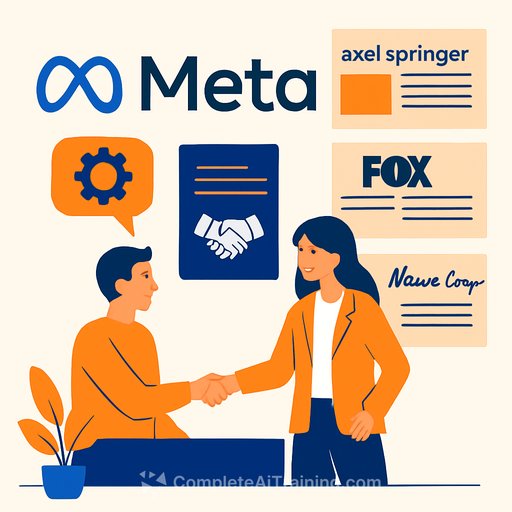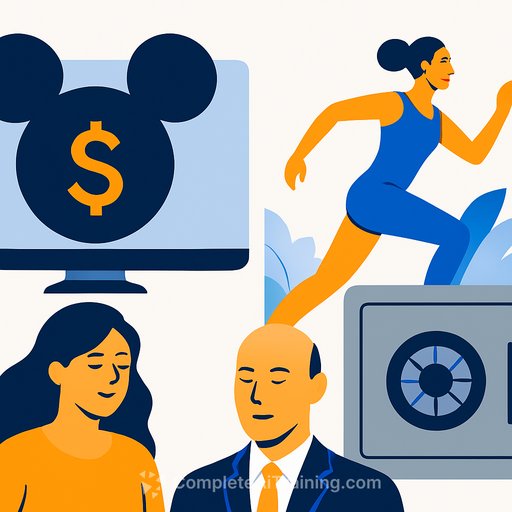Meta is negotiating AI news licenses. Here's what PR and Comms teams should prepare for
Meta Platforms Inc (NASDAQ:META, ETR:FB2A, SWX:FB) is in talks with major publishers - including Axel Springer, Fox Corp, and News Corp - to license news for its AI features across Facebook, Instagram, and WhatsApp, according to a Wall Street Journal report. If these deals land, AI-driven answers, chatbots, and assistants could pull more content directly from publisher feeds.
For PR and Communications teams, this means distribution, attribution, and corrections will run through new surfaces that sit between your message and the audience. Treat this as a new channel with its own rules, metrics, and escalation paths.
What this likely means for distribution and attribution
- AI surfaces may summarize publisher content and cite sources. Expect shorter pathways to your story and less traditional referral traffic.
- Attribution policies will matter. How your brand or client is credited, linked, or quoted inside an AI answer affects reach and trust.
- Embargo timing, updates, and corrections need a clear pipeline into AI systems to keep summaries accurate.
Rights and policy issues to get in order
- Define "training" vs "retrieval." Training uses data to improve models; retrieval displays your content or excerpts. These have different risk profiles and price points.
- Set guardrails for brand use: logos, headlines, images, and quote length. Confirm where content appears (apps, chatbots, smart glasses) and for how long.
- Compliance varies by region. Press publishers' rights in the EU influence licensing terms and enforcement.
Source reporting: Wall Street Journal. Context: EU press publishers' rights overview from the European Commission here.
Operational readiness for PR teams
- Structure content for AI: clear headlines, tight summaries, Q&A blocks, key facts, and datelines. Use consistent names, titles, and boilerplates to reduce misquotes.
- Strengthen metadata: schema.org NewsArticle, author/org, publish and update timestamps, canonical URLs, embargo markers, and rights statements.
- Clarify robots.txt and meta directives for AI crawlers. Document opt-out/opt-in policies per partner.
- Build or refine a newsroom API/RSS that includes rights, embargoes, and corrections so updates propagate fast.
- Create a corrections SLA and escalation path for AI answers. Who contacts whom, how fast, and what proof is required.
Negotiation checklist for publishers and brand owners
- Scope: which properties, formats (text, images, video), geographies, and use cases (search answers, chat, summaries).
- Attribution: link placement, logo use, snippet length, and co-branding. Require visible links and trackable parameters.
- Reporting: impression counts, click-throughs, query categories, and geo breakdowns. Ask for per-article analytics.
- Monetization: flat fee, usage-based, or revenue share. Define rate cards for breaking news vs evergreen.
- Safety and legal: hallucination indemnities, defamation procedures, takedown timelines, and audit rights.
- Data handling: storage, retention, and deletion after term end. No downstream sublicensing without consent.
Measurement and monitoring
- Set up distinct UTM schemes for AI referrals to separate them from social or search traffic.
- Track changes in direct and branded search after AI distribution goes live. Watch for cannibalization or lift.
- Monitor quote accuracy across AI surfaces. Maintain a living log of corrected facts and time-to-fix.
Team skills and tooling
- Train staff on prompting for verification, rapid fact-checking, and testing how AI renders your releases.
- Establish style guards: preferred names, product specs, approved descriptions, and boilerplate that AI can pick up consistently.
If your team needs structured AI upskilling for comms workflows, explore role-based options here: AI courses by job.
Key questions to ask Meta (or any AI distributor)
- How will attribution display and how are links prioritized? Can we require a link to the original?
- What's the correction and takedown process and timing? Is there an emergency path for high-risk errors?
- What usage rights are included: training, retrieval, summaries, voice, or translation? Any exclusivity or MFN clauses?
- What analytics will we receive and how often? Can we audit the counts?
- What safety systems and indemnities cover hallucinations, defamation, and harmful associations?
Bottom line
AI licensing will change how audiences find and consume publisher content. PR teams that prepare content, rights, and measurement now will protect accuracy, preserve traffic, and secure better terms.
Disclaimer: This article is for information only and does not constitute investment advice.
Your membership also unlocks:






